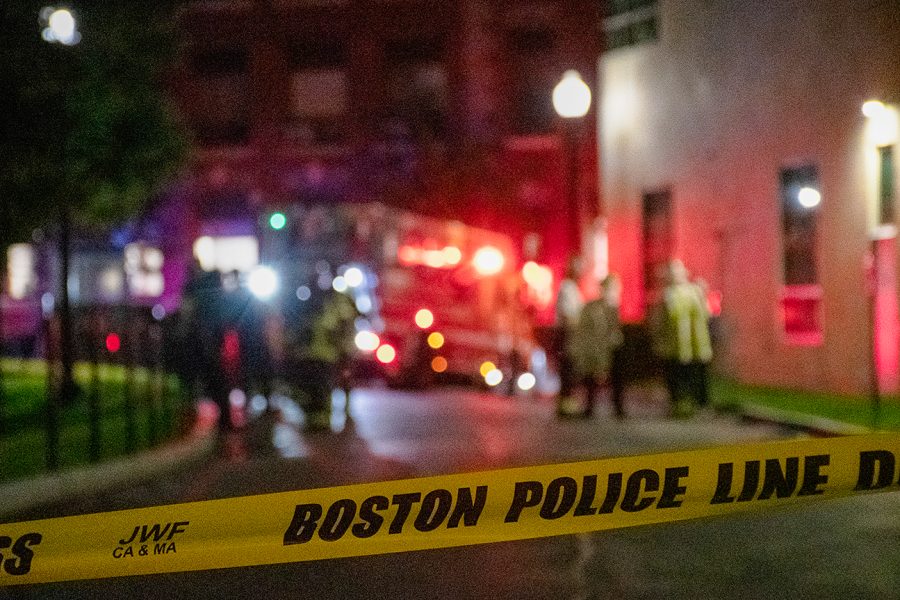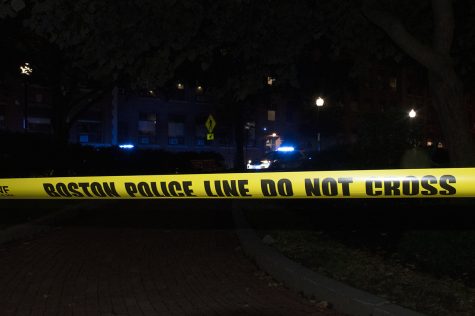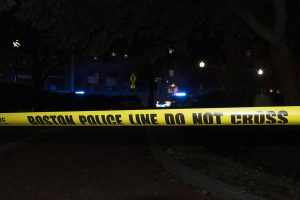Exploding package deemed a hoax, former staff member arrested in connection
The scene outside Holmes Hall after it was evacuated Sept. 13. Jason Duhaime, the former new technology manager and director of the Immersive Media Lab at Northeastern, was arrested Oct. 4 in connection with the exploding packaged.
October 4, 2022
A man has been arrested and charged in connection with the alleged exploding package found in Holmes Hall three weeks ago.
Jason Duhaime, the former new technology manager and director of the Immersive Media Lab at Northeastern, was arrested in the Western District of Texas Tuesday morning on federal charges of conveying false information and hoaxes related to an exploding device and making material false and fictitious statements to an agency of the U.S. government.
He will appear in federal court in Boston at a later date, according to the United States Attorney’s Office for the District of Massachusetts.
“In this case, we believe Jason Duhaime wanted to be the victim but instead victimized his entire community by instilling fear at college campuses in Massachusetts and beyond,” said FBI Special Agent in Charge Joseph R. Bonavolonta at a press conference Tuesday.
According to the U.S. Attorney’s Office, the 45-year-old from San Antonio, Texas, called 911 Sept. 13, alleging he had been injured by “sharp” objects being expelled from a plastic case he opened in Holmes Hall.
“Today’s arrest should be a warning to others that this is not a game, and threats like these are not a joke,” Bonavolonta said. “If you engage in this type of behavior, no matter who you are, or where you are, we will determine what you did, find you and hold you accountable.”
Jason Duhaime is accused of intentionally lying to the FBI about an explosive device inside his lab at Northeastern University, along with the threatening letter he allegedly wrote directed at the lab threatening more violence. Below is a photo of the pelican case and the letter. pic.twitter.com/vyuRk6Kekn
— FBI Boston (@FBIBoston) October 4, 2022
In a statement sent to The News, Northeastern thanked the FBI, the U.S. Attorney’s Office and the Boston Police Department for bringing the investigation to a close.
“Knowing what we know now about this incident, we would like to make it clear that there was never any danger to the Northeastern community,” the statement reads. “As always, the safety of our students, faculty, and staff is our highest priority.”
Though the university does not comment on personnel matters, the statement also confirms that Duhaime is no longer employed by Northeastern.
Our city, more than most, knows all too well that a report or threat of an explosion is a very serious matter and necessitates an immediate and significant law enforcement response, given the potential devastation that can ensue.
The events of Sept. 13 shook the Northeastern campus community and schools around Boston as students questioned their safety and administrative handling of the incident.
“This alleged conduct is disturbing to say the least,” said U.S. Attorney Rachael Rollins during a briefing Tuesday. “Our city, more than most, knows all too well that a report or threat of an explosion is a very serious matter and necessitates an immediate and significant law enforcement response, given the potential devastation that can ensue.”
According to the U.S. Attorney’s Office, forensic analysis of a computer seized during a search of Duhaime’s office allegedly revealed a word-for-word electronic copy of the letter in a backup folder. Metadata reflected a creation date of Sept. 13 at 2:57 p.m. and a last printing date of Sept. 13 at 4:02 p.m.
Duhaime expressly denied fabricating the story in an interview with the Boston Globe, and he is now being charged with making false statements to the authorities.
“Throughout the course of the investigation, we believe he repeatedly lied to us about what happened inside the lab, faked his injuries and wrote a rambling letter directed at the lab threatening more violence,” Bonavolonta said.
According to an affidavit written by FBI Special Agent Steven Kimball, Duhaime and a student who worked in the lab collected packages from the mail area in Meserve Hall the evening of Sept. 13. Among the packages were two Pelican cases that Duhaime brought into a storage closet, the U.S. Attorney’s Office wrote.
“Duhaime allegedly told the 911 operator that when he opened one of the cases inside the closet, ‘very sharp’ objects flew out of the case and under his shirt sleeves, causing injuries to his arms,” the U.S. Attorney’s Office wrote. “It is further alleged that Duhaime also reported that the case contained an anonymous ‘violent note’ directed at the Lab.”
The student who was working that night told officials they did not hear any noises from inside the closet besides Duhaime’s voice.
The report triggered a significant response from law enforcement and the evacuation of a number of campus buildings.
According to court documents, law enforcement observed that the Pelican case was empty and undamaged, and the letter also showed no indication of being exposed to a forceful or explosive discharge. The storage closet also appeared normal.
The letter found on the scene was a rambling, one-page letter accusing the university of working with Facebook founder Mark Zuckerberg and the U.S. government. The court filings include a photo of the letter.
The second case was still in the storage closet when officials responded, the court documents say. Officials X-rayed the case and determined it was empty, but out of an abundance of caution opened it using a render-safe tool, Kimball wrote in the affidavit.
Both cases were later sent to the FBI Forensic Laboratory in Quantico, Virginia, for further testing. The results of the testing are still pending, the documents say.
Duhaime’s statements to officials were inconsistent with the student’s account on a number of counts, the affidavit says. Among other differences, the affidavit says Duhaime told investigators the cases had been moved out of the mail staging area on Sept. 12 or 13 into a locked lab called the Useability Lab, but the student reported that they found the packages outside the Useability Lab. Duhaime also claimed the case was propelled into the air and fell to the floor when opened, but the student did not hear any sound consistent with that description, according to the affidavit.
Duhaime resides in Texas with his girlfriend and does not maintain a residence in Massachusetts, instead sleeping in his office or the lab while in the state, the documents say.
According to the U.S. Attorney’s Office, the charges of “intentionally conveying false and misleading information related to an explosive device and making materially false statements to a federal law enforcement agent” each can have a sentence of up to five years in prison, up to three years of supervised release and a fine of up to $250,000.




















